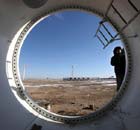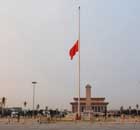Global General
Some EU flights resume but travel chaos not over
(Agencies)
Updated: 2010-04-20 23:10
 |
Large Medium Small |
LONDON - Many European flights took to the skies Tuesday for the first time in days but the travel chaos was far from over: London's airports remained shut, a massive flight backlog was growing and scientists feared that history could repeat itself with yet another volcanic eruption in Iceland.
London's airports - among the busiest in Europe and a major worldwide hub - are likely to stay closed until Wednesday, and forecasters said more delays were possible if the dense ash cloud remained over much of the country. Airspace in Germany also remained officially closed until 8:00 p.m. (1800 GMT) but a limited number of flights were allowed in at low altitude.
But it was the first day since Wednesday's eruption of Iceland's Eyjafjallajokull volcano - dormant for nearly 200 years - that travelers were given a glimmer of hope.
Cheers and applause erupted as flights took off from Paris' Charles de Gaulle Airport, Amsterdam and elsewhere.
"Everyone was screaming in the airplane from happiness," said Savvas Toumarides of Cyprus, who finally arrived in New York after getting stuck in Amsterdam for five days and missing his sister's wedding. He said the worst part was "waiting and waiting and not knowing."
"We were in the hotel having breakfast, and we heard an aircraft take off. Everybody got up and applauded," said Bob Basso of San Diego, who has been staying near Charles de Gaulle since his flight Friday was canceled. "There's hope."
Basso, 81, and his son had tickets for a flight to Los Angeles later Tuesday.
| ||||
"The situation today is much improved," said Brian Flynn, deputy head of operations at the Brussels-based agency.
But with more than 95,000 flights canceled in the last week alone, airlines faced the enormous task of working through the backlog to get passengers where they want to go a challenge that could take days or even weeks.
Passengers with current tickets were being given priority - stranded passengers were being told to either pay for a new ticket, take the first available flight or to use their old ticket and wait for days, or weeks, for the first available seat.
"I'm supposed to be home, my children are supposed to be in school," said Belgian Marie-Laurence Gregoire, 41, who was traveling in Japan with her husband and three children, ages 6, 8, 10. They said the best that British Airways could do was put them on a flight to Rome.
"I'm tired. I just want to go home," she said.
Although seismic activity at the volcano had increased, the ash plume appeared to be shrinking. Still, scientists were worried that the eruption could trigger an even larger eruption at the nearby Katla volcano, which sits on the massive Myrdalsjokull icecap and has erupted every 80 or so years. Its last major eruption was in 1918.
Magnus Tumi Gudmundsson, geophysicist at the University of Iceland, said there was circumstantial evidence that an eruption could occur within the next 18 months at the nearby Katla volcano.
"We can of course expect similar (travel) disruption with the Katla eruption," he said. "But it all depends on prevailing winds."
Of the eight eruptions in the last 40 years, only the recent eruption at Eyjafjallajokull was followed by winds blow the effects of volcanic ash demonstrates that it presents a very real threat to flight safety.
Ash and grit from volcanic eruptions can sabotage a plane, stalling engines, blocking fuel nozzles and plugging the tubes that sense airspeed.










